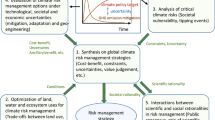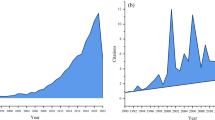Abstract
This paper expands our understanding of water manager's climate information (CI) use and of the effectiveness of interactive research efforts in improving use by quantitatively measuring usability both within and outside the interactive research model. Using a mixed method approach (i.e., interviews and surveys), data was collected across five states and hundreds of water managers to understand the production of CI by scientists at two Regional Integrated Sciences and Assessments (RISAs) employing an interactive approach and the use of that information by water managers in the corresponding RISA regions. This study finds that RISAs are effective in three important ways: first, in co-producing usable information and achieving a high rate of information use among RISA clients; second, in overcoming barriers to information use arising from negative perceptions about the usability and reliability of CI; and, finally, in fostering innovation. RISA information use is contingent on sustained scientist-client interaction and is enabled by users' willingness and capacity making RISAs most effective in reaching the largest, most capable users. These users and those who use CI from other sources do so as a strategy to manage risk. This research suggests areas for enhancing RISA CI uptake: structuring RISAs as consortia, cultivating relationships with knowledge brokers and capitalizing on existing knowledge networks, and increasing public education and outreach. Beyond the interactive research models, findings suggest CI uptake may be enhanced by building capabilities for long-term water planning at water systems and bolstering public science citizenship and climate literacy.

Similar content being viewed by others
Explore related subjects
Discover the latest articles and news from researchers in related subjects, suggested using machine learning.Notes
CWS are public water systems that supply water to at least 25 people year-round (EPA 2009).
The states are Arizona, New Mexico, Washington, Oregon, and Idaho.
CIG is in the PNW. While the work of the Climate Impacts Group continues, the program at the University of Washington did not receive funding to continue hosting the PNW RISA. Instead, in 2010 funding was awarded to a new host site the Climate Impacts Research Consortium (CIRC) at Oregon State University (CIRC 2010).
These are water managers identified as clients by the RISAs themselves who are involved in information co-production.
Non-clients are water managers at CWS who do not identify as RISA collaborators.
Results were derived from analysis of survey respondents (CWS managers, n = 660, 25 %) to determine who among respondents used RISA information in water resources planning or decision making. Statistical analyses were conducted to determine what influenced information use among this group.
Comparing system size and information use across the three groups (clients, non-client RISA users, and C2I users) finds the system size of RISA clients are several orders of magnitude larger than non-client RISA users. In turn, the system size of non-client RISA users are on average four times the size of C2I users who themselves are on average over twice the size of non-users.
References
Abtew W, Trimble P (2010) El Niño–Southern oscillation link to South Florida hydrology and water management applications. Water Resour Manag 24(15):4255–4271
Anderson C, Cayan D, Dettinger M, Dow K, Hartmann H, Jones J, Miles E, Mote P, Overpeck J., Shafer M, Udall B, White D (2009) Climate services: The RISA Experience
Brueuer NE, Fraisse CW, Cabrera VE (2010) The cooperative extension service as a boundary organization for diffusion of climate forecasts: a 5-year study. J Ext 48(4):1–5
Callahan B, Miles E, Fluharty D (1999) Policy implications of climate forecasts for water resources management in the Pacific Northwest. Policy Sci 32:269–293
Carbone GJ, Dow K (2005) Water resource management and drought forecasts in South Carolina. J Am Water Res Assoc 41:145–155
Cash DW (2001) In order to aid in diffusing useful and practical information: agricultural extension and boundary organizations. Sci Technol Hum Values 26(4):431–453
Cash DW, Clark WC, Alcock F, Dickson NM, Eckley N, Guston DH, Jäger J, Mitchell RB (2003) Knowledge systems for sustainable development. Proc Natl Acad Sci 100(14):8086–8091
Cash DW, Borck JC, Patt AG (2006) Countering the loading-dock approach to linking science and decision making: comparative analysis of El Niño/Southern Oscillation (ENSO) forecasting systems. Sci Technol Hum Values 31(4):465–494
Changnon S, Kunkel K (1999) Rapidly expanding uses of climate data and information in agriculture and water resources: causes and characteristics of new applications. Bull Am Meteorol Soc 80:821–830
Climate Change Impacts Research Consortium (CIRC) (2010) PNW Climate Impacts Research Consortium. http://pnwclimate.org. Accessed 5 November 2011
Climate Change Science Program (CCSP) (2008) Decision-Support Experiments and Evaluations using Seasonal-to-Interannual Forecasts and Observational Data: A Focus on Water Resources. A Report by the U.S. Climate Change Science Program and the Subcommittee on Global Change Research, Beller-Simms N, Ingram H, Feldman D, Mantua N, Jacobs KL, Waple AM (eds). NOAA’s National Climatic Data Center, Asheville
Climate Program Office (CPO) (2010). Currently Funded RISAs. www.climate.noaa.gov/cpo_pa/risa. Accessed 18 December 2012
Dilling L, Lemos MC (2011) Creating usable science: opportunities and constraints for climate knowledge use and their implications for science policy. Global Environ Chang Hum Policy Dimens 21(2):680–689
Environmental Protection Agency (EPA) (2002) Community Water System Survey 2000. Office of Water report EPA 815-R-02-005A. http://www.epa.gov/safewater/consumer/pdf/cwss_2000_volume_i.pdf. Accessed 4 January 2009
Feldman DL, Ingram HM (2009) Making Science Useful to Decision Makers: Climate Forecasts, Water Management, and Knowledge Networks. Wea Climate Soc 1:9–21
Feldman DL, Jacobs KL, Garfin G, Georgakakos A, Morehouse B, Restrepo P, Webb R, Yarnal B (2008) Making Decision-support Information Useful, Useable, and Responsive to Decision Maker Needs. In: Decision-support Experiments and Evaluations using Seasonal to Interannual Forecasts and Observational Data: A Focus on Water Resources.US Climate Change Science Program, Washington DC
Glantz MH (1982) Consequences and responsibilities in drought forecasting: The case of Yakima, 1977. Water Resour Res 18:3–13
Guston DH (2000) Between Politics and Science: Assuring the Integrity and Productivity of Research. Cambridge University Press, New York
Guston DH (2001) Boundary organizations in environmental science and policy: an introduction. Sci Technol Hum Values 26(4):399–408
Hartmann HC, Pagano TC, Sorooshian S, Bales R (2002) Confidence builders: evaluating seasonal climate forecasts from user perspectives. Bull Am Meteorol Soc 8(5):683–698
IPCC (2007) Climate Change 2007: Impacts, Adaptation and Vulnerability. In: Parry ML, Canziani OF, Palutikof JP, van der Linden PJ, Hanson CE (eds) Contribution of working group II to the fourth assessment report of the intergovernmental panel on climate change. Cambridge University Press, Cambridge
Lemos MC (2008) Whose water is it anyway? Water management, knowledge, and equity in NE Brazil. In: Whiteley J, Perry R, Ingram H (eds) Water, Place and Equity. MIT Press, Cambridge, pp 249–270
Lemos MC, Morehouse B (2005) The co-production of science and policy in integrated climate assessments. Global Environ Chang Hum Policy Dimens 15(1):57–68
Lemos MC, Rood RB (2010) Climate projections and their impact on policy and practice. WIREs Clim Chang 1:670–682
Lemos MC, Kirchhoff CJ, Ramprasad V (2012) Narrowing the climate information usability gap. Nat Clim Chang 2:789–794
McNie EC (2008) Co-Producing Useful Climate Science for Policy: Lessons from the RISA Program. Environmental Studies Program, University of Colorado, Boulder
National Research Council (NRC) (2008) 2008. In: Ingram HM, Stern PC (eds) Research and networks for decision support in the NOAA Sectoral Applications Research Program. Panel on Design Issues for the NOAA Sectoral Applications Research Program. Committee on the Human Dimensions of Global Change, Division of Behavioral and Social Sciences and Education. The National Academies Press, Washington, DC
O’Connor RE, Yarnal B, Dow K, Jocoy CL, Carbone GL (2005) Feeling at risk matters: water managers and the decision to use forecasts. Risk Anal 25:1265–1275
Pagano TC, Hartmann HC, Sorooshian S (2001) Using climate forecasts for water management: Arizona and the 1997–1998 El Niño. J Am Water Res Assoc 37:1139–1153
Pagano TC, Hartmann HC, Sorooshian S (2002) Factors affecting seasonal forecast use in Arizona water management: a case study of the 1997–1998 El Niño. Clim Res 21:259–269
Pulwarty R, Redmond KT (1997) Climate and salmon restoration in the Columbia River Basin: the role and usability of seasonal forecasts. Bull Am Meteorol Soc 78(3):381–397
Pulwarty RS, Simpson C, Nierenberg CR (2009) The Regional Integrated Sciences and Assessments (RISA) program: crafting effective assessments for the long haul. In: Knight CG, Jäger J (eds) Integrated Regional Assessment of Global Climate Change. Cambridge University Press, Cambridge
Rayner S, Lach D, Ingram H (2005) Weather forecasts are for wimps: why water resource managers do not use climate forecasts. Clim Chang 69:197–227
Rice JL, Woodhouse CA, Lukas JJ (2009) Science and decision making: water management and tree-ring data in the Western United States. J Am Water Res Assoc 45(5):1248–1259
Sarewitz D, Pielke RA (2007) The neglected heart of science policy: reconciling supply of and demand for science. Environ Sci Pol 10(1):5–16
Schwarz HE, Dillard LA (1990) Urban water. In: Waggoner PE (ed) Climate change and U.S. water resource. John Wiley & Sons, New York
Simpson C (2009) Regional Integrated Sciences and Assessments: FY 2010 Information Sheet
Snover AK, Hamlet AF, Lettenmaier DP (2003) Climate-Change Scenarios for Water Planning Studies: Pilot Applications in the Pacific Northwest. Bulletin of the American Meteorological Society Nov: 1513–1518
Steinman A, Havens K, Hornung L (2002) The Managed Recession of Lake Okeechobee, Florida: Integrating Science and Natural Resource Management. Conserv Ecol 6(2):17
Stern PC, Easterling WE (1999) Making climate forecasts matter. National Research Council, Panel on Human Dimensions of Seasonal-to-Interannual Climate Variability. National Academy Press, Washington, DC
Vedwan N et al (2008) Institutional evolution in Lake Okeechobee management in Florida: characteristics, impacts, and limitations. Water Resour Manag 22(6):699–718
Wilbanks TJ, Kates RW (1999) Global change in local places: how scale matters. Clim Chang 43(3):601–628
Yarnal B, Heasley AL, O’Connor RE, Dow K, Jocoy CL (2006) The potential use of climate forecasts by community water system managers. Land Use Water Resour Res 6:3.1–3.8
Acknowledgments
The Peter M. Wege Foundation, the Dan David Prize, and University of Michigan’s Rackham Graduate School and the School of Natural Resources and Environment generously funded this research. Lisa Dilling, Amy Burnicki, and Maria Carmen Lemos provided insightful comments on manuscript drafts and Danielle Lavaque-Manty gave exceptional editorial assistance. Any errors or omissions are the responsibility of the author. Lastly, I thank the numerous water managers who provided primary data for this research and the RISA scientists and program managers for their participation and support of this research effort. Without them this research would not have been possible.
Author information
Authors and Affiliations
Corresponding author
Electronic supplementary material
Below is the link to the electronic supplementary material.
Online Resource 1
Results of logistic regression model of RISA Use regressed on water source, natural log population served, collaboration, information sources, distance, endangered species/instream (IS) flows, and drought. (DOCX 25 kb)
Online Resource 2
Final Regression Model with Log Odds, Standard Errors, and Confidence Intervals (DOCX 24 kb)
Rights and permissions
About this article
Cite this article
Kirchhoff, C.J. Understanding and enhancing climate information use in water management. Climatic Change 119, 495–509 (2013). https://doi.org/10.1007/s10584-013-0703-x
Received:
Accepted:
Published:
Issue Date:
DOI: https://doi.org/10.1007/s10584-013-0703-x




